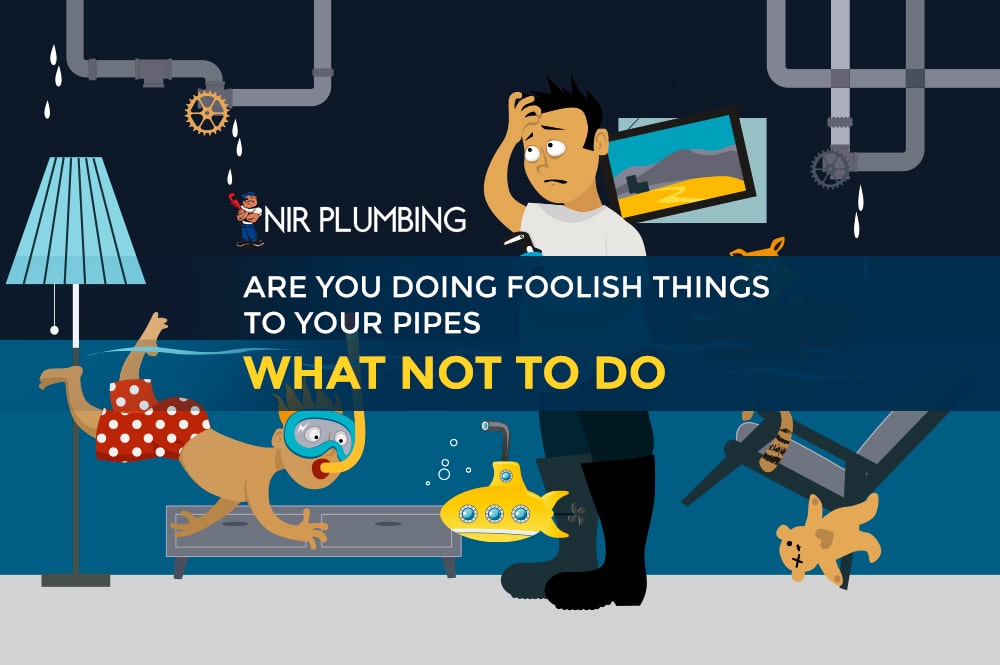Here are 5 things you shouldn’t do to your pipes (that you probably already do)
Some of the worst things people do to their pipes might seem the least harmful. Liquid drain cleaners… potato skins… what’s the harm? (A lot… trust us.) If you can relate to any of the following, keep reading for your own benefit (and your pipes’ and eventually wallet):
-
Relying on liquid drain cleaners
-
Flushing foreign objects
-
Attempting big plumbing jobs by yourself
-
Grease
-
Potato skins in the drain
The reality is that the biggest threat to your plumbing is likely you — and your bad habits that wreak havoc on your drains and pipes. Although some plumbing mishaps are out of our control, others are due to our own carelessness, ignorance, or ability to convince ourselves that it simply isn’t that bad for our pipes.
(1) Liquid drain cleaners are NOT the answer to every plumbing issue
When you’ve got a clogged drain, avoid the temptation of the quick fix promised by liquid drain cleaners. Actually, liquid drain cleaners are not all they’re cracked up to be. Not only are these products marginally effective at best, but they contain harsh chemicals that can generate heat and cause cracks in your pipes or react with existing corrosion and cause dangerous chemical reactions.
The chemicals that make up these commercial cleaners are harmful to your pipes, even if the label claims that it’s safe for your plumbing. Over time, these products corrode your pipes, which can set you up for an expensive repair down the road. Save your plumbing by avoiding these products.
Solution: If your drain is just a little slow or you’re looking to prevent clogs, you can address these concerns will some simple drain maintenance steps.
-
Hot water. Every month or so, pour a pot full of hot (not boiling) water down the drain. This will melt clogs. Then follow with some cold water to wash them away.
Baking soda and vinegar. This classic combo from your fourth-grade volcano project is a wildly effective drain cleaner as well. Pour half a cup of baking soda down the drain, followed by half a cup of vinegar. Then, plug your sink and allow it to sit overnight. In the morning, unplug the sink and wash it down with hot water. Doing this once a month can help prevent clogs.
(2) Foreign objects might be cool… but not when being flushed
Treating your toilet like a garbage can will definitely cause clogs, obstructions and a major bill from a plumber. The most important thing you can do to protect your plumbing is to avoid flushing foreign objects into the toilet, such as feminine hygiene products, paper towels, baby wipes, and anything else that’s not toilet paper.
(3) Please leave the big plumbing jobs to the experts (you won’t regret it… trust us)
If you’re like most people, you probably take your plumbing for granted — until it doesn’t work anymore. Then, getting it fixed becomes an emergency. Without proper plumbing, it’s impossible to clean, cook and bathe. That’s why it’s important to partner with a plumbing company you can trust. Professional plumbers can be expensive, but that doesn’t mean you should tackle a big plumbing job on your own. An inexperienced DIYer can make huge mistakes like joining two different metal pipes together, over-tightening the connections or forgetting to turn off the water before starting a project.
Before you embark on a misguided DIY project, get bids from a number of reputable plumbers, then hire one of them to help you solve your water woes. Hiring a professional plumbing service can save you money in the long-run and ensure the problem is taken care of once and for all.
Benefits: Trained and Licensed Plumbers; The Right Equipment; Provides Multiple Services; Get a Better Outcome; Emergency Services.
Read 5 Benefits of Hiring a Professional Plumbing Service here.
(4) Grease might’ve worked for Danny Zuko, but your drain isn’t Danny
After cooking a sizzling pan of bacon, the worst thing you could do to your pipes is to pour that grease down the drain. Why? Because grease solidifies once it cools off. Sure, it might flow out of the pan and down the drain, but in a few minutes the grease solidifies in the pipes and acts as a sticky trap for gunk and debris. The fat from the grease will coat the pipes and over time this blockage can clog the pipes or slow the drain. Grease also wreaks havoc on local sewer systems and septic tanks. Significant amounts of grease in sewers (fatbergs!) have even clogged neighborhood sewer systems.
Solution: Grease – If the grease is still hot, simply pour it into a dedicated grease jar or can. A mason jar works well, or you can make a disposable grease can by removing the lid of a soda can with a can opener. When the jar or can fills up, simply scoop out the solid grease into the trash bin or throw out the entire can. You may also leave the grease in the pan, wait till it solidifies, and then wipe it out with paper towels.
Already poured grease down the drain? Pour a gallon of boiling water slowly down the drain while you run the faucet on the hottest temperature setting. While you do this, squirt dish soap down the drain. The hot water should re-liquefy any solid grease, and the soapy water should hopefully carry it out of the pipes.
Related information: Why You Should Never Pour Grease Down the Drain
(5) Potato skins are good to eat, but your drain isn’t ready for all that
Peeling potatoes over the sink may make the task easier, but don’t even think about washing them down the garbage disposal or you could create a thick, starchy mess that will seriously clog your pipes. Potato peels contain a high amount of starch that can clump up and form a thick paste that clogs your disposal. Intact peels can also pass through the disposal and collect in the drain trap or other piping, creating a tough clog.
Solution: Instead of using the disposal, peel potatoes directly into a plastic grocery bag or onto newspapers or paper towels before discarding into a trash receptacle or relocating to your compost bin. Or, to avoid this mess, throw your peels in the compost pile where they’ll break down into nutritious fertilizer for your garden.
Read the full article: Potato Peels and Garbage Disposals


